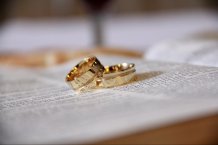
Each year many couples in England and Wales have a wedding ceremony which is meaningful to them but is not recognised by the law
Current laws governing weddings are too outdated and restrictive and do not reflect the diversity of faith and beliefs in modern society, a new report from experts at the Universities of Warwick and Exeter highlights.
The law doesn't allow the types of ceremonies many couples want to have and does not cater for the needs of different communities and religious groups, experts have said. Consequently, each year many couples in England and Wales have a wedding ceremony which is meaningful to them but is not recognised by the law.
For many, this means also having a legal wedding, sometimes at considerable expense. Others will not have a legal wedding, whether because they do not wish to be legally married, do not regard the legal wedding as a priority, or do not realise that they are not legally married.
Reforms to weddings law are already being considered by the Law Commission. It has proposed removing the need for prescribed words in wedding ceremonies and allowing weddings to take place in a wider range of locations. Its scheme could also – subject to decisions by Government - accommodate Humanist and independent celebrants, who are currently unable to conduct legal weddings. The Law Commission's final report is expected to be published in July this year. This new research is designed to inform its recommendations as well as to increase awareness and understanding of the range of non-legally recognised ceremonies which take place.
The report is the result of a Nuffield Foundation funded project carried out by Dr Rajnaara Akhtar from the University of Warwick Law School, Professor Rebecca Probert from the University of Exeter Law School, and Sharon Blake from the University of Warwick and the University of Exeter Medical School.
Researchers spoke to 170 people via focus groups and interviews, of whom 82 were involved in conducting non-legally binding ceremonies and 88 had gone through such a ceremony. Most of those who had such a ceremony also had a legal wedding. However, about a fifth had not yet done so, of whom most were Muslim couples who had entered into a nikah.
Nearly all of those who had a religious-only ceremony without a legal wedding were aware that it was not legally recognised. The majority of those who conducted these ceremonies took steps to ensure that couples were aware of the non-legally binding nature of the ceremony despite having no obligation to do so.
Interviewees had a range of reasons for having a religious ceremony without a legal wedding. Some couples had a religious ceremony as they would not regard themselves as married without a ceremony conducted in line with the norms of their faith group. For some, having a non-legally binding ceremony was a way of testing their relationship with their partner before making a legal commitment.
Most of those who had been in a religious-only marriage had either gone on to have a legal wedding or had plans to do so, although these plans ranged from having a register office wedding already booked to vaguer hopes of getting married at some future point. Very few of those who had not yet had a legal wedding had no plans to do so in future, and were satisfied with the status of their relationship.
Other couples chose a Humanist ceremony because this aligned with their beliefs and values, or had a ceremony led by an independent celebrant, a friend, or a member of the family. All these couples also had a legal wedding, however, most would have preferred the ceremony led by an independent or Humanist celebrant to be legally recognised. Likewise, almost all of those who worked as Humanist or independent celebrants were keen to be authorised to officiate at legal weddings.
Many non-legal ceremonies contained religious-like rituals, suggesting that there is no sharp dividing line between 'religious' and 'non-religious' ceremonies. Many of those whose legal wedding preceded or followed their non-legally binding ceremony would have preferred to have had a single ceremony that was both legally recognised and conducted in a manner, and at a location that was meaningful to them.
Professor Probert, who is also the specialist advisor for the Law Commission's Weddings Project, said: "The current law is too limited and restrictive for the pluralistic needs of contemporary society. Reform is needed to reflect the diversity of beliefs and practices. The demographic profile of England and Wales has changed significantly in recent decades but the law governing weddings has largely failed to address or accommodate these changes."
Lead researcher, Dr Rajnaara Akhtar said: "Our findings suggest that reform of weddings law is not only important but also achievable and is long overdue. Our participants believed the Law Commission's proposals for reform would make it easier, more inclusive, and cheaper for couples to have a legal wedding that was meaningful to them. In particular, removing the need for prescribed words was seen by participants as crucial in making weddings law more inclusive and enabling couples to consent to be married in a way that is in accordance with their beliefs."
Ash Patel, Justice Programme Head, at the Nuffield Foundation said: "This research demonstrates the disconnect between the outdated law surrounding weddings and the demography and preferences of modern society. It makes a clear case for urgent reform to weddings law so that it better reflects the cultural and social diversity and richness of the individuals and communities that make up the population England and Wales".






